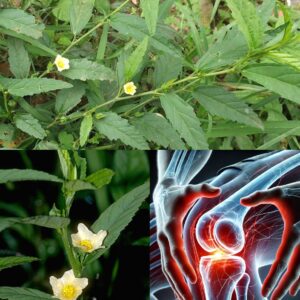The Superfood That Tastes Better Than Meat—7 Reasons to Grow It in Your Garden

Imagine a superfood that not only packs a nutritional punch but also tastes better than meat—yes, you read that right. There’s a plant-based wonder that has been gaining attention for its incredible health benefits and its rich, savory flavor that can easily substitute for meat in many dishes. This superfood is none other than Moringa, and it might just be the perfect addition to your garden. Here are seven reasons why you should consider growing Moringa and reaping the benefits of this nutritional powerhouse.
1. Nutrient-Rich and Health-Boosting
Moringa is often referred to as the “drumstick tree” or “miracle tree” because of its incredible nutritional profile. Packed with vitamins A, C, and E, calcium, potassium, iron, and protein, it has more vitamin C than oranges, more potassium than bananas, and more calcium than milk. This makes Moringa an excellent choice for those looking to boost their immune system, improve bone health, and increase energy—all with a single plant.
2. Meat-Like Taste with None of the Drawbacks
One of the standout qualities of Moringa is its ability to mimic the taste of meat. When cooked, its leaves and pods have a savory, umami flavor that’s remarkably similar to meat, making it an ideal substitute for those looking to reduce their meat consumption or follow a plant-based diet. You can use Moringa in stews, soups, stir-fries, or even in wraps to achieve that hearty, satisfying flavor without the fat or cholesterol associated with animal products.
3. Sustainable and Easy to Grow
Moringa is a low-maintenance plant that thrives in hot and dry climates. Whether you have a small garden or a large one, Moringa can grow in containers or directly in the soil, requiring very little water once established. It’s drought-tolerant, which makes it an ideal crop for areas with water scarcity. The plant is also fast-growing, reaching mature height in just a few months, meaning you’ll have access to fresh, nutritious leaves in no time.
4. Rich in Antioxidants for Disease Prevention
Moringa is a natural powerhouse of antioxidants that help protect the body from free radical damage. The leaves and pods are rich in compounds like quercetin, chlorogenic acid, and beta-carotene, which are known to have anti-inflammatory and anti-aging properties. Regular consumption of Moringa can help reduce the risk of chronic diseases, such as heart disease, diabetes, and even some types of cancer. Its rich antioxidant profile makes it an important part of a health-conscious diet.
5. Supports Digestive Health and Detoxification
Moringa has been used for centuries as a natural remedy for digestive issues. The plant is known to soothe the stomach, improve digestion, and reduce bloating. It has antibacterial properties that help fight gut infections and promote a healthy microbiome. The fiber content in Moringa also helps with regular bowel movements and aids in detoxifying the body. Growing Moringa in your garden gives you easy access to a plant that can naturally help maintain a healthy digestive system.
6. Supports Brain Health and Mental Clarity
Moringa has been linked to improved brain function and mental clarity. The plant contains vitamins and minerals that support cognitive health and protect against neurodegenerative diseases like Alzheimer’s. Additionally, Moringa has anti-anxiety and mood-boosting effects, making it a great addition for anyone seeking a natural way to manage stress or improve focus. Moringa’s rich content of vitamin E and vitamin C can also protect brain cells from oxidative stress and support overall mental well-being.
7. Environmental Benefits
Growing Moringa not only benefits your health but also the environment. This fast-growing plant helps to reduce soil erosion, and its roots act as a natural barrier against desertification in arid areas. Because Moringa thrives in harsh conditions, it is an important crop for regions with limited access to water or fertile soil. It also helps to sequester carbon in the atmosphere, making it an eco-friendly plant choice for those looking to support sustainable agriculture.
Conclusion: Moringa—A True Superfood and Garden Treasure
When you grow Moringa in your garden, you’re not just planting another typical vegetable or herb—you’re cultivating a nutrient-rich, sustainable powerhouse that can change the way you eat, live, and care for your environment. From its meat-like taste to its numerous health benefits, Moringa truly is nature’s miracle plant. Whether you’re looking for a plant-based meat substitute, a natural detoxifier, or a powerful antioxidant, Moringa offers it all. Don’t overlook this incredible superfood—its potential to improve your health and enrich your garden is limitless.
News
Be Happy Movie Review: Abhishek Bachchan’s Latest Venture Faces Mixed Reactions – Another Flop?
Be Happy Movie Review: Abhishek Bachchan’s Latest Venture Faces Mixed Reactions – Another Flop? Abhishek Bachchan’s much-anticipated movie Be Happy has finally hit the screens, but unfortunately, it seems the film has failed to live up to the high expectations…
Chaos in Bachchan Household: Amitabh and Ajitabh’s Bond Shatters Amid Explosive Clash
Chaos in Bachchan Household: Amitabh and Ajitabh’s Bond Shatters Amid Explosive Clash Bollywood’s most respected family faced unexpected turmoil as shocking news emerged from Amitabh Bachchan’s iconic Jalsa residence. Reports surfaced of a heated altercation between the legendary actor and…
Manisha Koirala’s Shocking Allegation: Aishwarya Rai Behind Miss World Controversy
Manisha Koirala’s Shocking Allegation: Aishwarya Rai Behind Miss World Controversy In the glitzy corridors of Bollywood, where friendship and rivalry walk hand-in-hand, a storm erupted as veteran actress Manisha Koirala boldly spoke out about Aishwarya Rai, alleging a startling claim…
Midnight Raid Unveils Orry’s Secret Party Scandal
Midnight Raid Unveils Orry’s Secret Party Scandal The city’s luxurious Sapphire Hotel stood illuminated against the midnight sky, its neon glow masking the secrets hidden within its extravagant suites. Orry, a well-known socialite infamous for his lavish lifestyle, had always…
If You Have This Leaf in Your Compound, You Actually Have Gold—But You Don’t Know It
If You Have This Leaf in Your Compound, You Actually Have Gold—But You Don’t Know It Nature is full of hidden treasures, and some of them could be right in your own backyard, quietly waiting to be discovered. One of…
The Hidden Power of Stubborn Grass: Nature’s Humble Treasure You Didn’t Know You Had
The Hidden Power of Stubborn Grass: Nature’s Humble Treasure You Didn’t Know You Had Most gardeners see stubborn grass merely as a frustrating weed that refuses to leave, no matter how much they try to eradicate it. However, behind this…
End of content
No more pages to load








 At Ayan Mukherjee’s Fateh Prayer Meet.
At Ayan Mukherjee’s Fateh Prayer Meet.


